Obtaining a marriage license in Georgia is a legal requirement for marriage․ The process involves submitting an application, providing necessary documents, and paying the required fee․ This document ensures the marriage is legally recognized in the state, outlining the steps and requirements for couples to follow․ Proper application is essential for a valid marriage certificate․
Overview of the Marriage License Application Process in Georgia
The marriage license application process in Georgia involves several steps, starting with completing the application form online or in person․ Both applicants must appear together at the county probate court, providing required documents like identification and divorce papers if applicable․ The application is reviewed, and a fee is paid․ Once approved, the license is issued, typically on the same day․ Couples must use the license within 30 days, as it expires after this period․ Proper submission ensures a smooth process․
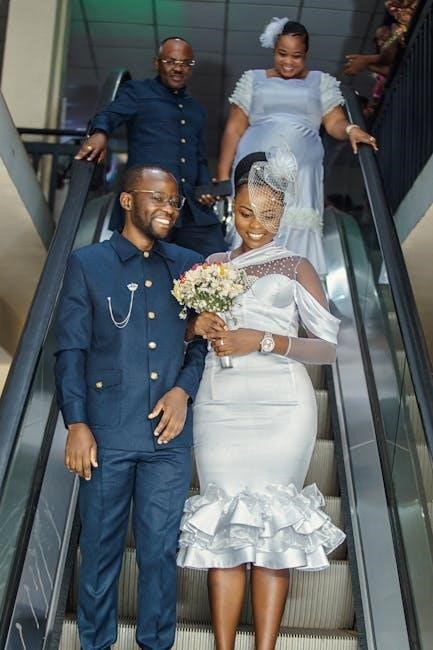
Importance of a Marriage License in Georgia
A marriage license in Georgia is a legal requirement for marriage, ensuring the union is officially recognized by the state․ It validates the marriage, enabling couples to access legal benefits, such as name changes, inheritance rights, and joint ownership of property․ The license also serves as proof of marriage for government records, social security, and other administrative purposes․ Obtaining a license ensures compliance with state laws and provides a formal record of the marriage, which is essential for various legal and administrative procedures․

Eligibility Criteria for Marriage License in Georgia
Applicants must be at least 18 years old, mentally capable, and not currently married․ If underage, parental consent is required․ Same-sex marriages are legally recognized․
Age Requirements for Applicants
In Georgia, applicants for a marriage license must be at least 18 years old․ Individuals aged 17 can apply with parental consent, while those under 17 are ineligible․ These age requirements ensure legal capacity to marry, preventing underage marriages without proper authorization․ The state enforces strict age guidelines to safeguard minors and ensure informed consent․ Proper identification and, if applicable, parental documentation must be provided to verify age eligibility during the application process․
Residency Requirements for Georgia Marriage License
Georgia requires at least one applicant to be a state resident to issue a marriage license, which can then be obtained from any county probate court․ Non-residents must apply in the county where the ceremony will take place․ This ensures the license is valid for the specific location of the marriage․ Applicants can easily apply through their local probate court, with residency verified via identification․ These requirements streamline the process and ensure compliance with state marriage laws, making it straightforward for couples to obtain their license;
Mental Capacity and Other Legal Requirements
To obtain a Georgia marriage license, both applicants must be of sound mind and legally competent to consent to marriage․ They must not have any living spouse and meet Georgia’s legal age requirements․ Additionally, applicants must not be closely related by blood, as per state laws․ These requirements ensure the marriage is legally valid and that both parties enter the union willingly and without legal impediments․ Proper documentation and verification of these criteria are essential for a valid marriage certificate in Georgia․
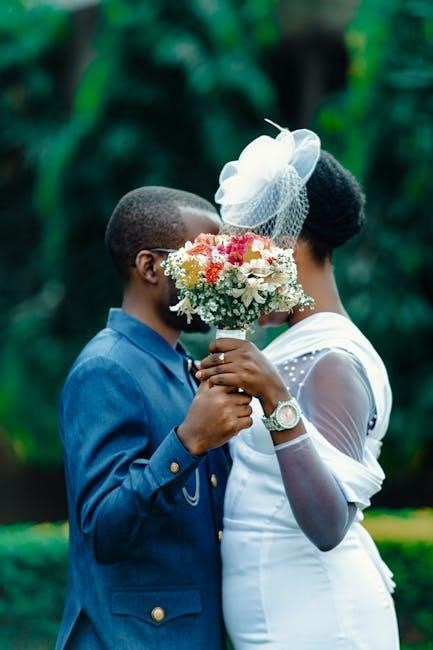
Documents Required for Marriage License Application
Applicants must provide valid photo ID, divorce/death certificates (if applicable), and birth certificates․ Social Security information is also required, though the card may not always be needed․
Identification Documents Needed
Applicants must present valid government-issued photo identification, such as a driver’s license, passport, or state ID․ Both parties must provide proof of age and identity․ Divorce or death certificates are required if either applicant has been previously married․ Social Security information is also necessary, though the physical card may not always be required․ Ensuring all documents are up-to-date and accurate is crucial for a smooth application process․
Divorce or Widowhood Documentation
If either applicant has been divorced or widowed, proper documentation must be provided․ A certified copy of the divorce decree or spouse’s death certificate is required․ The document must be finalized and include the court’s seal or case number․ If the divorce is recent, ensure the paperwork is complete․ Widowhood requires proof of the spouse’s passing․ These documents ensure no legal barriers exist for the new marriage․ The legal name after divorce must match the identification provided to avoid delays․
Other Supporting Documents
Beyond identification and divorce documentation, applicants may need to provide additional paperwork․ This includes a certified birth certificate to verify age, especially for underage applicants requiring parental consent․ Social Security cards or proof of eligibility may also be requested․ If a name change is involved, legal documents like court orders must be submitted․ Premarital agreements, if applicable, should be presented․ Ensuring all documents are valid and up-to-date is crucial for a smooth application process․ These requirements vary by county, so checking local guidelines is recommended․
Application Process for Georgia Marriage License
The application process involves submitting a completed form online or in person at the probate court․ Both applicants must appear together with required documents to finalize the application and receive the license after verification․
Online Application Submission
Applicants can initiate the process by completing the marriage license application online․ The online form requires basic personal and parental information․ Once submitted, applicants must visit the probate court with required documents and fees․ Online submission streamlines the process, reducing wait times․ Ensure all information is accurate to avoid delays․ After online submission, applicants receive a confirmation to present in person․ This step is mandatory for both residents and non-residents․ Online applications are processed promptly, making it a convenient option for couples planning their wedding․
In-Person Application Requirements
Both applicants must appear in person at the probate court to complete the application process․ Two forms of valid identification are required, such as a driver’s license or passport․ Divorced or widowed individuals must provide documentation, such as a divorce decree or death certificate․ The court may request additional information to verify eligibility․ Payment of the marriage license fee is due at the time of application, and only accepted payment methods are allowed․ In-person submission ensures all requirements are met efficiently․
Completing the Marriage License Application Form
The marriage license application form requires detailed personal information, including full names, dates of birth, and Social Security numbers․ Applicants must disclose prior marriages, including divorce or widowhood details․ Both parties must sign the form jointly, confirming the accuracy of the provided information․ Some counties allow partial online completion, but final submission must be done in person․ Ensure all fields are filled accurately to avoid delays in processing․ Proper completion is essential for a valid marriage license issuance․
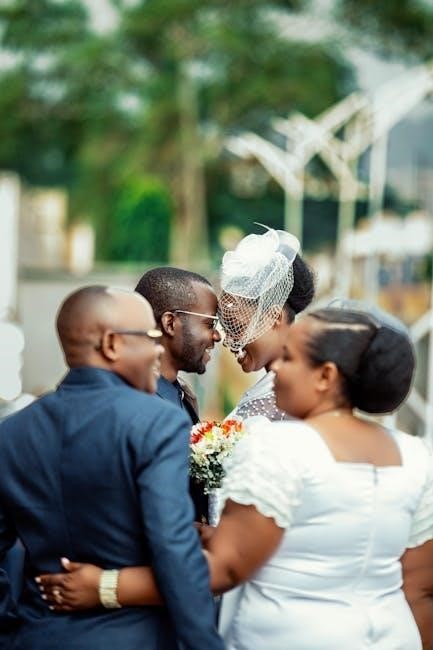
After Submitting the Application
Once the application is submitted, it is reviewed for completeness․ Upon approval, the marriage license is issued, enabling the couple to proceed with their wedding ceremony․
Obtaining the Marriage License
After submitting the application, the marriage license is typically issued the same day or within a short period․ Couples must appear together to collect it․ The license is valid for 30 days from issuance․ Once obtained, it must be presented to the officiant performing the ceremony․ After the wedding, the completed license is returned to the issuing court for recording․ This step finalizes the marriage, ensuring it is legally recognized in Georgia․
Next Steps After Receiving the License
After receiving the marriage license, couples should schedule their ceremony within the 30-day validity period․ Ensure the officiant meets Georgia’s legal requirements to perform the ceremony․ The completed license, signed by the officiant and witnesses, must be returned to the issuing court for recording․ Once recorded, the marriage is officially recognized, and couples can obtain a certified marriage certificate if needed for legal or administrative purposes․
Fees and Payment Methods
Georgia marriage license fees range from $56 to $100, depending on the county․ Payment methods include cash, credit, or debit cards․ Discounts may apply for premarital counseling․
Current Fees for Marriage License in Georgia
The current fee for a Georgia marriage license is $56 to $100, varying by county․ This includes the license and certificate․ Payments are typically accepted via cash, credit, or debit․ Some counties may charge extra for services like ceremonies․ Fees are non-refundable and subject to change, so checking with the local probate court is recommended for accurate information․
Accepted Payment Methods
Georgia counties typically accept cash, credit cards, or debit cards for marriage license fees․ Some may also accept personal checks or money orders, but policies vary․ It’s advisable to call ahead and confirm accepted payment methods with the local probate court․ Additionally, some counties offer online payment options for convenience․ Ensure payment is made in full at the time of application, as fees are non-refundable and subject to change․ Verify accepted methods beforehand to avoid delays․
Fee Discounts for Premarital Counseling
Georgia offers a discounted marriage license fee for couples who complete a qualifying premarital counseling program․ The state encourages couples to undergo counseling to strengthen their relationship․ Eligible programs must meet specific criteria, such as being at least six hours long and covering topics like communication and conflict resolution․ Upon completing the program, couples receive a certificate to submit with their application, reducing the license fee by $40․ This discount is a state-wide policy aimed at fostering healthier marriages and is applied at the time of application submission․
Legal Requirements for Marriage in Georgia
Georgia requires couples to be at least 18 years old, of sound mind, and not currently married․ These legal standards ensure the marriage is valid and enforceable․
Marriage Ceremony Requirements
In Georgia, the marriage ceremony must be performed by a licensed officiant, such as a judge or ordained minister․ Two witnesses are required to attend and sign the marriage license․ The ceremony must take place within Georgia, and the officiant is responsible for completing the license and returning it to the probate court within 30 days․ This ensures the marriage is legally recognized and recorded in the state’s records․
Witness Requirements for the Ceremony
In Georgia, a marriage ceremony requires the presence of at least two witnesses․ These witnesses must be at least 18 years old and capable of understanding the solemnity of the event․ They are required to attend the ceremony, observe the exchange of vows, and sign the marriage license as confirmation of their attendance․ Witnesses do not need to be Georgia residents, and there are no specific restrictions on their relationship to the couple․ Their signatures serve as legal verification of the marriage․
Officiant Requirements for Performing the Ceremony
In Georgia, the officiant performing the ceremony must be authorized by state law․ This includes judges, ordained ministers, and other officials who are at least 18 years old․ They must be legally recognized in Georgia to conduct weddings․ After the ceremony, the officiant must sign and submit the marriage license to the probate court within 30 days․ This step ensures the marriage is legally recorded and recognized by the state․

Common Questions About Georgia Marriage License
Couples often inquire about same-sex marriage, name change procedures, and the validity period of the license․ These questions are addressed in detail in the application guidelines provided online․
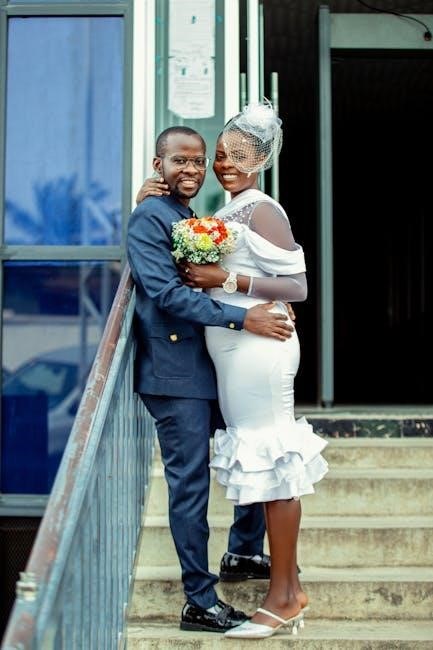
Same-Sex Marriage in Georgia
In Georgia, same-sex marriage is legally recognized, and couples have the same rights and requirements as opposite-sex couples․ The application process for a marriage license is identical for all applicants, ensuring equality under the law․ Same-sex couples must meet the same eligibility criteria, including age, mental capacity, and residency requirements․ They must also provide the necessary documentation, such as valid photo identification and, if applicable, divorce or annulment papers․ Georgia welcomes all couples and ensures a fair and straightforward process for obtaining a marriage license․
Name Change After Marriage
After marriage, one or both spouses may choose to change their last name․ In Georgia, this process typically involves obtaining a marriage certificate and filing the appropriate forms․ The marriage license serves as legal documentation for the name change․ Spouses can update their names on Social Security cards, driver’s licenses, and other official documents․ The process is straightforward, ensuring that the name change is legally recognized․ Couples should notify relevant institutions, such as banks and employers, to complete the transition smoothly․
Validity of Marriage License
A Georgia marriage license is valid for 30 days from the date of issuance․ Couples must use the license within this timeframe to perform the ceremony․ The license is only valid for marriages performed within the state of Georgia․ Once the ceremony is completed, the officiant must return the signed license to the issuing probate court for recording․ The license expires if not used within the 30-day period, requiring the couple to reapply if they wish to marry after the expiration date․
Additional Resources and Information
Visit the official Georgia government website or local county probate court sites for marriage license application forms and detailed instructions․ Online platforms and court contacts provide further assistance․
Where to Find the Marriage License Application Form
The Georgia marriage license application form can be found on the official Georgia government website or through local county probate court websites․ Visit the Georgia Department of Public Health or specific county sites, such as Fulton or Hall County, to access the form․ Many counties offer downloadable PDF versions of the application, allowing couples to fill it out before submitting it in person․ Ensure you verify the form’s authenticity with your local probate court for accuracy․
Online Platforms for Application Submission
Georgia offers online platforms for marriage license applications, streamlining the process․ Couples can access the application form through the Georgia Probate Court website or specific county portals like Fulton or Hall County․ Once completed online, applicants must still appear in person at the court to sign and submit the form․ Ensure all required documents and fees are prepared․ Online submission saves time but does not eliminate the need for an in-person visit to finalize the application․
Contact Information for Probate Courts
To apply for a marriage license in Georgia, visit your local county probate court․ Contact information varies by county, but most courts provide details on their official websites․ For example, Fulton County Probate Court can be reached at (404) 730-4080, while Hall County is at (770) 531-7058․ Non-residents must apply in the county where the marriage will occur․ Visit the Georgia Probate Court website for a directory of counties and contact details to find your local office and verify office hours or specific requirements․
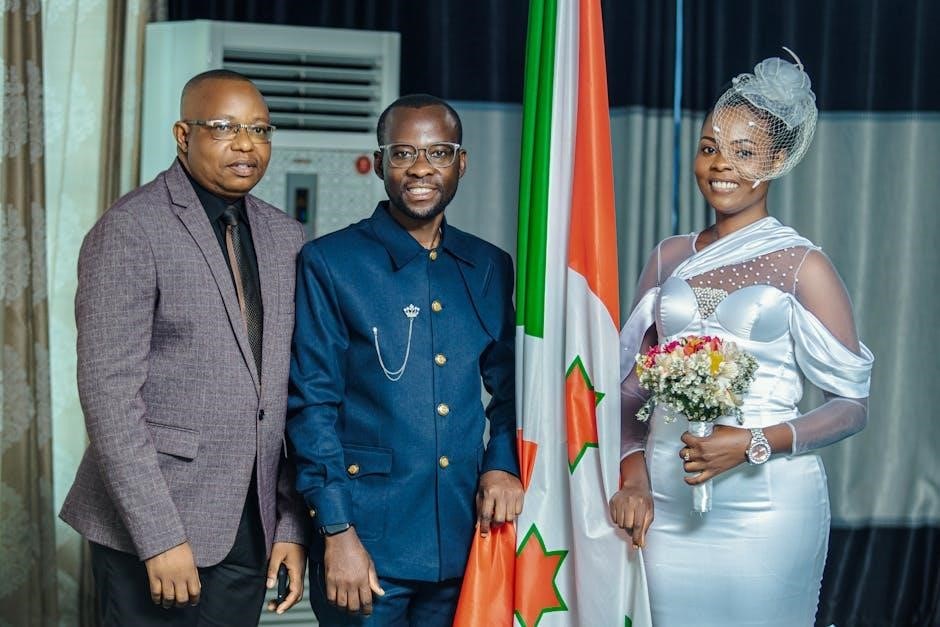
Special Considerations
Special considerations include underage applicants requiring court approval, non-residents applying in the marriage county, and international applicants needing additional documentation for legal marriage recognition in Georgia․
Underage Applicants and Requirements
In Georgia, applicants under 18 must meet specific requirements․ Those aged 17 require parental consent or court approval, while applicants under 17 are ineligible․ A court order is mandatory for 17-year-olds, ensuring legal capacity․ Both parties must provide birth certificates and Social Security documentation․ Underage marriages are subject to strict scrutiny to prevent coercion․ Legal guardians or parents must accompany minors during application․ Courts may require counseling or additional documentation to approve underage marriages, ensuring the decision is voluntary and informed․ Consult local authorities for precise requirements and legal advice․
Non-Resident Applicants
Non-residents can apply for a Georgia marriage license in any county․ While residency isn’t required, the marriage must occur in Georgia․ Non-resident applicants must meet the same eligibility criteria as residents, including age, mental capacity, and valid identification․ They must provide required documents, such as ID and divorce papers if applicable․ Fees and processing times remain consistent․ Non-residents should apply in the county where the ceremony will take place to ensure compliance with local regulations․ Proper documentation ensures a smooth application process for out-of-state couples marrying in Georgia․
International Applicants
International applicants must provide valid identification and meet Georgia’s legal requirements․ Non-English documents may require translation; International couples should ensure their marriage certificate is recognized in their home country․ They must comply with Georgia’s marriage laws, including age and mental capacity requirements․ International applicants should consult the county probate court for specific documentation needs․ Proper preparation ensures a smooth application process and avoids delays․ International couples are advised to verify all legal requirements before applying to ensure compliance with Georgia’s marriage laws․
Applying for a Georgia marriage license requires careful preparation and attention to legal requirements․ Ensure all documents are accurate and submitted on time for a smooth process․
Final Tips for a Smooth Application Process
To ensure a seamless experience, make an appointment and apply online in advance․ Bring all required documents, including identification and divorce papers if applicable․ Fill out the application accurately and completely․ Double-check fees and payment methods beforehand․ Understand residency and age requirements․ Arrive early at the probate court and confirm all details before submission․ Following these steps will help avoid delays and ensure your marriage license application is processed efficiently․
Importance of Timely Application
Timely application for a Georgia marriage license is crucial to avoid delays in your wedding plans․ Apply well in advance to ensure processing time, as licenses are typically issued immediately but may require up to a day for approval․ Late applications can lead to rescheduling or additional fees․ Plan ahead, complete the application accurately, and submit it early to ensure your marriage ceremony proceeds smoothly without legal or logistical issues․ This ensures a stress-free and well-organized experience for your special day․